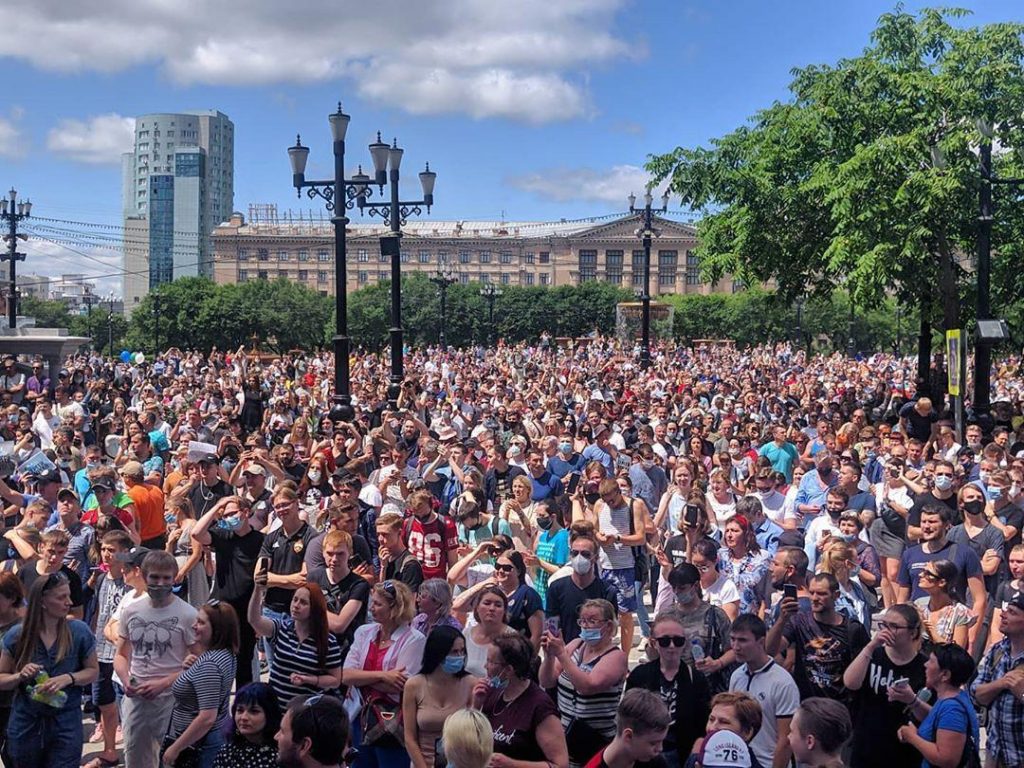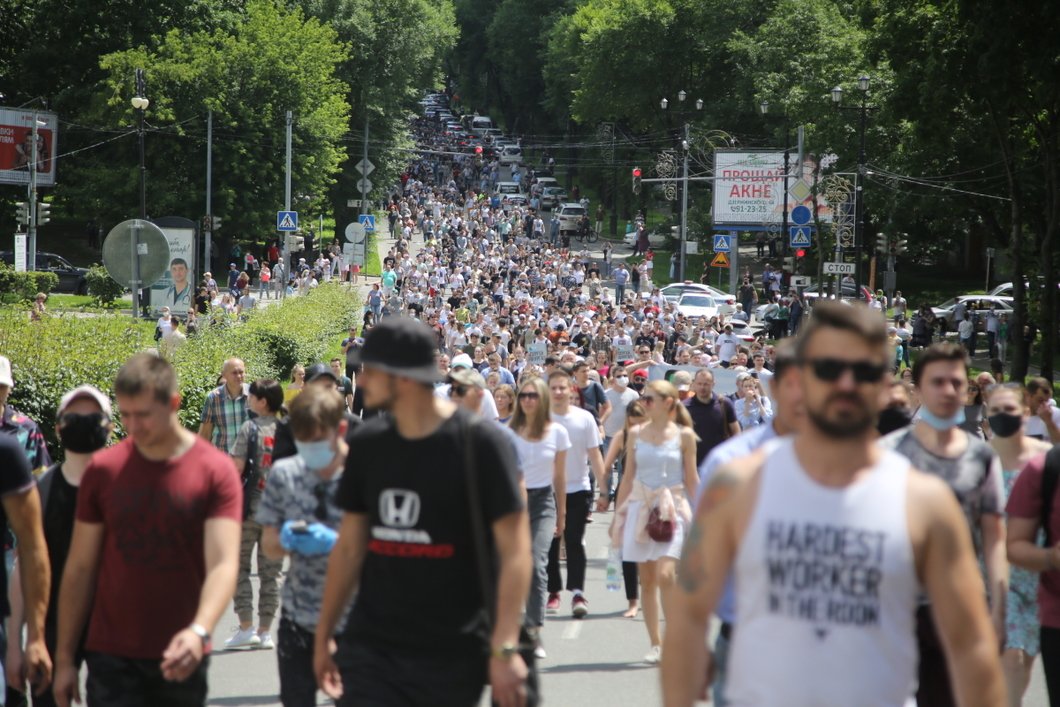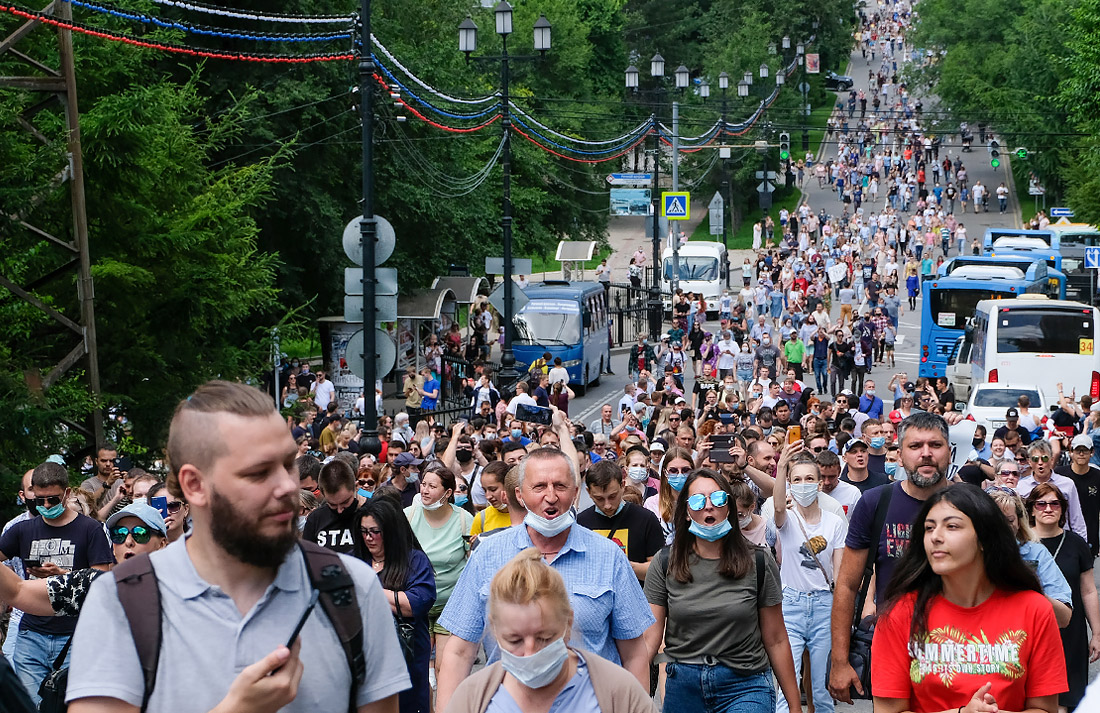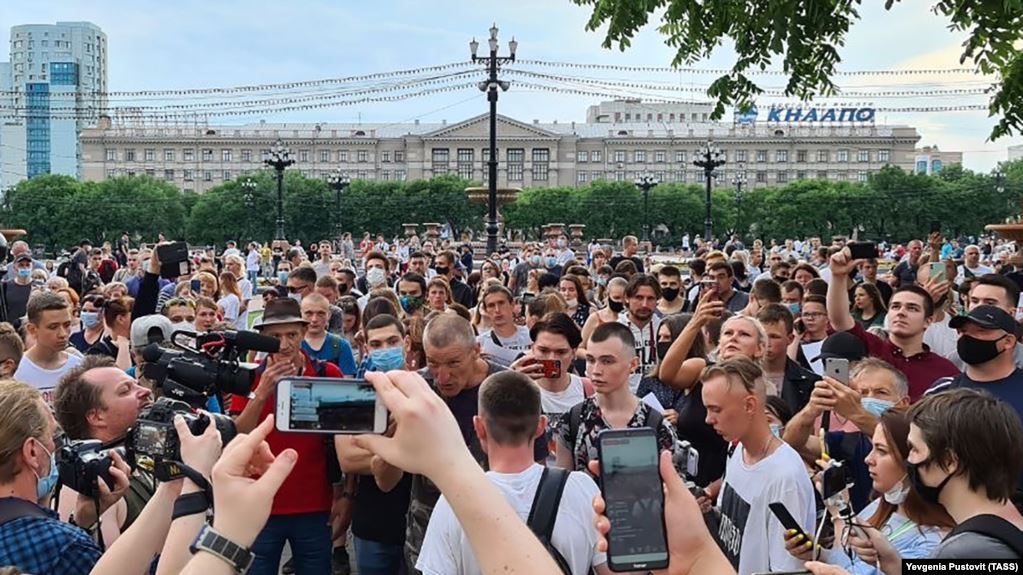On the morning of July 9, 2020, the governor of Khabarovsk Krai, Sergei Furgal, was arrested by FSB officers on the doorstep of his home in Khabarovsk. He was flown to Moscow and charged with the murder of several businessmen and the attempted murder of another in 2004-2005. The next day, the Basmanny Court of Moscow remanded Furgal in custody for two months ahead of his trial. Thus, the Governor of Khabarovsk Krai has not been officially dismissed from his post, but is now awaiting trial behind bars.
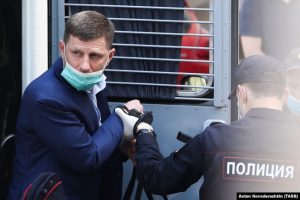
Sergei Furgal, an MP from the Liberal Democratic Party of Russia (led by the controversial and outspoken Vladimir Zhirinovskiy), became governor of Khabarovsk Krai in September 2018, defeating Viacheslav Shport, the candidate of Vladimir Putin’s United Russia party.
Shport and Furgal first ran in the gubernatorial elections back in 2013, when Shport won, gaining 63.92% of the votes against 19.14%. However, the situation changed radically in 2018, when Furgal gained 69.57% and Sport 27.97%. Furgal’s victory was considered a blow to United Russia’s tight grip on power in the distant Russian regions.
In the September 2019 elections, the Khabarovsk Liberal Democratic Party won 30 of the 36 seats in the Regional Legislative Assembly and 34 of the 35 seats in the Khabarovsk City Council, as well as municipal elections in a number of other regional cities.
In November 2019, the FSB searched the company linked to Furgal. However, few people expected the duly elected governor to be arrested on murder charges dating back 15 years. And, it came as a complete surprise to everyone that, despite such serious allegations, thousands of people from Khabarovsk and the region’s second-largest city, Komsomolsk-on-Amur, took to the streets in support of their governor and against Moscow. The police did not intervene, and no arrests were reported.
In fact, Russia has been struggling to deal with the rising numbers of COVID-19 cases, so the President of Russia deferred much of the decision-making around the pandemic to governors and other local leaders.
There have been many speculations regarding these mass protests, and why they mobilized so many people and so quickly. Below are some remarks collected on social media.
In his FB post of July 9, Russian political analyst and Putin’s former speechwriter Abbas Gallyamov argues that the arrest serves as a warning to candidates preparing to run in the upcoming September elections:
“Furgal’s arrest has strong political connotations.
First, it’s a warning to all opposition candidates participating in the gubernatorial campaigns that are beginning now: don’t even try running for office; things will get even worse for you if you win.
Second, it’s a warning to the gubernatorial corps: don’t even imagine that “coronavirus federalization” is serious; all power that was transferred to the regions during the epidemic must be returned intact.
Way back in spring of 2020, some political experts warned that there would be a crackdown on the regional governors. The Moloch power vertical demands sacrifice!”
Pro-Kremlin political scientist Sergei Markov claims that Khabarovsk is not protesting against Vladimir Putin, but against the pro-Western technocrats in charge of Russia’s economic policy:
“Political unrest in Khabarovsk Krai. Why did it happen?
- This is a protest against the Kremlin’s disregard for the development of the region. People compare with the Soviet period and conclude that the USSR had large-scale regional projects, whereas today, the government only imitates economic development. The region needs large state projects, and not useless chatter about invisible market demands.
- This is a protest against the economic decline of the Russian Far East as compared with neighbouring China and other Asian countries. Neighbouring Chinese regions are growing steadily, while the Russian government lags behind, waiting for bank funding and Western hand-outs.
- This is a protest against government cuts to social programs. The Soviet era saw important social programs for the regions, but these have all been dismantled. Consequently, residents of this region don’t have enough to even visit their relatives in Russia’s European part. This is very painful to everyone.
- This is a protest against the discrimination of ethnic Russians in Russia. The indigenous peoples of the Far East have been allowed to keep the old pension system, while Russians are forced to work five extra years before retiring.
- This is a protest against the criminalization of the economy in the Far East, a definite fusion of crime, government and business. Moscow isn’t doing anything, and from time to time punishes not the guiltiest parties, but those that have very few toes to the central government.
- This is a protest of the brave, because living in the Far Eastern border regions makes people fearless.
The conclusion is that this is not a protest against Putin, but a protest against those pro-Western technocrats who are in charge of the economy and politics. The government should take advantage of the protests in the Far East and make some strategic changes to their economic policy.”
Financial analyst Vladyslav Zhukovsky tweeted the following message:
“Well done! Khabarovsk has shown us how to stand up against the total lawlessness of the state! The same actions are required to protest against implementing pension reforms, raising VAT and gasoline and utilities prices, nullifying the Constitution and usurping power.
Tens of thousands of people chanted: “Shame on Moscow!”
Award-winning Russian journalist Sergei Kanev remarked in a bantering tone:
“I’m waiting for the Secretary of the Security Council of Russia, Nikolai Patrushev, to announce another piece of rubbish concerning the protests in Khabarovsk in support of Sergei Furgal, namely that they were organized by foreign intelligence services and the Soros Foundation. Mr. Patrushev, you’re getting old…”
Russian journalist and blogger Pavel Prianikov believes that the protests are neither spontaneous nor popular, and believes that they highlight the conflict within the Russian elite.
“A few remarks about the rally in Khabarovsk:
– Apparently, 1% or 2% of the city’s population is enough to hold a rally without any opposition from the security forces. Khabarovsk has a population of 600,000 – this means about 7-10,000 came out in protest. For Moscow, this would mean from 150-200,000 people. Let me remind you that in recent years only 0.3-0.4% of any urban population is allowed to protest.
– The protests in Khabarovsk also target Moscow. This topic has been around for a long time. The Moscow intelligentsia doesn’t seem to realize this.
– The rally in Khabarovsk couldn’t have taken place without the tacit consent of the local elites. This probably means that the country is returning to the old model of the late 1990s, the boom of regionalism. This situation will be more difficult to handle than targeting bloggers or millennials.”
Popular writer, satirist and radio host Viktor Shenderovich voices some pointed comments:
“The situation is quite tragicomic, because Sergei Furgal is clearly not Vaclav Havel. But, whatever, as these are minor details against the background of much more important things.
When Russians are finally ready to choose an administration through honest, equal and free elections, then we can all start talking about the quality of the elected individuals. In the meantime, we’re still discussing our right to do this, and not just bow to the next moronic leader of the Horde, chosen to reign over us.
Well done Khabarovsk!”
Russian politician and Putin critic Alexei Navalny took his comments one step further:
“Two great pieces of news! And both from the Kremlin. 1) They’ve established who organized the protests in Khabarovsk and Komsomolsk-on-Amur. It’s me, of course. Just imagine how powerful I am! 2) I received 1 million euros for organizing these protests. Hooray! I’ll order pizza and champagne for all the protesters!”
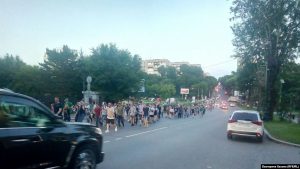
The protests continued in Khabarovsk on Tuesday, July 14. Many locals disagree not only with Furgal’s arrest, but they also protest against the government in far-off Moscow.
“We’re not scum! We’re not afraid! We’re against the Putin regime!” “Do they know how we live here? It’s a rich region, but we exist, we survive, most people are up to their necks in debt!”
Furgal’s is the second high-profile arrest in Russia in the past week. On July 7, former investigative journalist and adviser to the Russian space agency Roscosmos, Ivan Safronov, was arrested on charges of espionage for the Czech security service. He was formally charged on July 13.
On July 6, a journalist from a radio station in Pskov in Western Russia, Svetlana Prokopieva, was found guilty by a military court for “justifying terrorism”. On July 7, the prosecutor demanded 15 years of prison for Yuriy Dmitriev, a historian who uncovered mass graves from Stalin’s executions. Piotr Verzilov, head of the website Mediazona, reporting on conditions in the Russian penitentiary system, has been detained several times, the latest on July 8.
According to the Telegram channel Protestnaya Rossiya, rallies are scheduled in Moscow and St. Petersburg on July 15 to protest the results of the vote, allegedly falsified by the Kremlin, on amendments to the Constitution of the Russian Federation.




